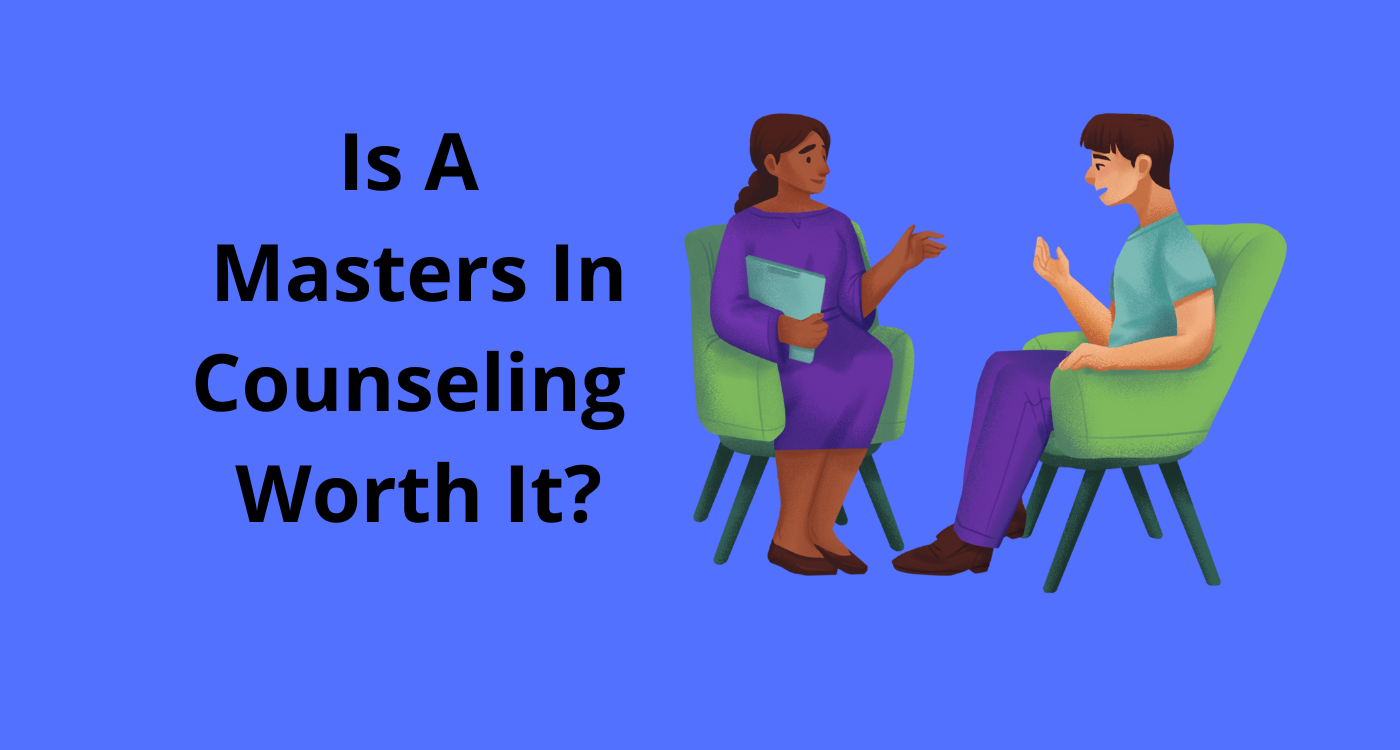Introduction
Is a masters in counseling psychology worth it? If you’re interested in working in the field of mental health, you probably already know that many of the most popular roles require graduate-level education. One way to fulfill that requirement is to obtain your Masters in Counseling Psychology.
But it’s important to consider this before obtaining any degree: What can you do with it once you’ve obtained it?
In the sections that follow, we define counseling psychology, examine the most typical career paths for persons with an MS in Counseling Psychology, and emphasize the areas for which the degree will prepare you.
What Is Counseling Psychology?
A branch of professional psychology called counseling psychology is dedicated to enhancing interpersonal and personal functioning in all areas of life. It crosses over organizational, developmental, social, emotional, educational, and occupational demands.
By bypassing cultural and racial barriers, counseling psychology focuses on people’s behavioral patterns, their interactions, and their roles in a particular society. Additionally, counseling psychology addresses issues such as functionality at home, work, and school as well as mental, emotional, physical, and social health.
A counseling psychologist is a specialist who aids those with emotional, mental, and physical requirements to find happiness, increase their productivity, and contribute more favorably to society. A counseling psychologist can help with poor self-esteem, emotional suffering, and conflict management and resolution.
A counseling psychologist must work with clients at all phases of life, resolving problems both individually and collectively.
A particular sort of practice within the larger subject of psychology is counseling psychology. Understanding how patients behave both on an individual level and in the context of their numerous connections with family, friends, coworkers, etc. is a key component of counseling psychology.
Counseling psychologists use this knowledge to support their patients as they deal with a variety of issues, such as anxiety, family dysfunction, alcoholism and other addictions, and more.
People frequently contrast clinical psychology which usually concentrates more on people with diagnosable mental illnesses and psychopathologies with counseling psychology. There are huge overlaps between the two fields.
What Do Counseling Psychologists Do?

In the field of professional psychology, counseling psychologists offer general health services.
Counseling psychologists concentrate on the personal and interpersonal functioning of individuals at all stages of life. They support people in reducing their level of discomfort, enhancing their sense of well-being, and resolving problems so that they can be more productive. Psychologists that specialize in counseling can also evaluate, identify, and manage a variety of psychological problems, from minor to more significant ones.
To raise the quality of life for their clients, counseling psychologists adopt a comprehensive strategy centered on emotional, educational, behavioral, and social issues. Counseling psychologists may also assist mentally sound people who need help coping with stressors in their lives such as those brought on by their jobs, chronic pain, family dynamics, love relationships, and drug usage.
What Do Counseling Psychologist Duties Entail?
A licensed counseling psychologist may be responsible for tasks like:
- Improved coping and communication techniques for patients.
- Completing patient evaluations and reporting.
- Examining and identifying people with a range of mental health issues.
- Determining and assigning resources to assist clients in managing their pressures.
- Designing client treatment programs that are effective.
- Studying client behavior patterns.
- Creating educational initiatives in the community, schools, and hospitals.
- Collaborating with relatives, medical professionals, social workers, or case managers.
- Assisting patients in times of need.
- Counseling psychologists deal with clients’ problems both individually and collectively to combat poor self-esteem and lessen emotional or mental distress.
- Counseling psychologists also educate and conduct research on how one’s psychological health and behavior are influenced by environmental variables and human characteristics including gender, race, religion, sexual orientation, and ability.
Masters In Counseling Psychology: What It Entails
The master’s degree in counseling psychology trains people who want to work as counselors, in professions linked to counseling, or who want to pursue doctorate study. A wide and all-encompassing introduction to counseling psychology theory, research, and therapeutic practice is provided through the curriculum. Students who pursue a Master of Science in counseling psychology can concentrate on mental health counseling.
You will develop the self-awareness, expertise, and abilities needed by counseling professionals as a Master of Counseling Psychology student. The curriculum encourages the blending of practice, theory, and research abilities. You will gain knowledge of how to evaluate the efficacy of programs, devise evidence-based change methods, and assess clients in their social and familial situations. The program is firmly committed to social justice, diversity, and inclusion.
Masters In Counseling Psychology: Degree Requirements
The course load for the concentration in mental health is equivalent to around 60 credits. Additional coursework in developmental psychology, research, diagnosis, and psychopathology is necessary for addition to the counseling psychology core (which includes counseling theory, career development, interviewing, assessment, group counseling, professional concerns, and practicum). Each student finishes either a thesis, a research project, or a thorough test. Students should meet with an advisor soon after starting the program to create a schedule for finishing their degree requirements.
Motives for Pursuing a Masters in Counseling Psychology
- Competitive Salary
Most counseling psychologists start with an average salary of $74,200, according to Recruiter.com. Additionally, the fact that about one-third of counseling psychologists are self-employed will be welcomed by professionals who value flexibility.
- Job Stability and Demand
According to the U.S. Bureau of Labor Statistics, employment of psychologists is expected to grow by 3% between 2017 and 2029, with the majority of jobs being best suited for those with an applied specialty. No matter which area of psychology you select counseling psychology, for example choosing a specialism can improve your chances of finding work.
Additionally, picking a concentration will make you more marketable to employers once you graduate. Popular areas of concentration include: Guidance for Children and Adolescents, Forensic Therapy, Health Psychology, Political, Cultural, & Gender Psychology, Early Assistance, and Research.
- The Chance to Influence Change
What kind of effect you hope to have in your work is maybe the most important question to ask yourself.
Do you want to work or do you want to change the world?
Counseling psychology may be the profession that enables you to help people with emotional, behavioral, and mental health issues while also pursuing your passion for helping others. Psychologists that specialize in counseling are typically compassionate listeners with great interpersonal and communication skills. To analyze, diagnose, and prescribe treatment and coping methods to assist people to deal with chronic emergencies, they work with both individuals and groups.
By deciding to pursue a profession in counseling psychology, you can significantly impact how much less anguish and crisis your future client experience.
- Variety and Flexibility
Professional psychologists that specialize in counseling operate in offices, classrooms, mental health facilities, hospitals, rehabilitation facilities, or military establishments. Working with a range of customers to develop wellness solutions that address problems with physical, emotional, and mental health is possible for experts in this line of work.
Counselors are required everywhere, including in public and private institutions, professions, and businesses. To accommodate clients who work a variety of hours and shifts, counselors might work throughout the day or at night.
Career Options For A Masters In Counseling Psychology
The following list is a great place to start if you’re wondering what a master’s degree in counseling psychology may assist you with. With a master’s in psychology, you can work as a therapist, but graduates of a program in counseling psychology may also pursue the following positions in the future:
- Health Psychologist
A health psychologist can assist those who are managing chronic illnesses, guiding them through the healing process, and figuring out the best strategies to manage discomfort and encourage healthier habits. To maximize their patients’ functional potential, health psychologists must be aware of how social, biological, and psychological aspects can impact their patients’ disorders.
- Organizational Counselor
Counseling psychologists can opt to work in businesses or other settings where professionals congregate to support workers in achieving their highest levels of productivity and effectiveness.
When employees are emotionally and mentally in balance, at ease, and ready to perform their hardest, productivity is at its highest level. To accomplish these objectives, an organizational counselor supervises interventions, tactics, and suggestions for workplace change.
- Sports Psychologist
A sports psychologist can even assist athletes in achieving their goals in both their personal and professional lives. Sports psychologists assist players in utilizing psychology to improve their athletic performance, preserve stability in their daily life, and get beyond obstacles and mental blocks. Sports psychologists may frequently try to understand how physical activity and better mental health are related.
- School Counselor
Counseling psychologists can assist students with mental health issues, scholastic difficulties, career development strategies, and the development of their social skills. Based on knowledge of the social environment at school, a counseling psychologist can provide guidance and recommendations to kids within an educational setting. Psychologists who specialize in school counseling may also teach general psychology, do research, and provide other mental health services.
- Group Counselor
Counseling psychologists may provide support to a group of people who are dealing with comparable problems. By arranging gatherings where people can share their experiences in a secure and encouraging environment, group counselors assist individuals in improving themselves as a group. Group-oriented treatment efficiently addresses mental health on a wider scale, assisting a greater number of individuals in enhancing their quality of life and overall well-being.
- Clinical Social Worker
To provide mental health treatments and a better living environment, counseling psychologists may serve as clinical social workers. Clinical social workers can help military personnel or veterans who are suffering from depression, PTSD, or other losses. They might also help abuse or trauma survivors to create long-term therapy programs that will improve their feeling of well-being.
- Adult And Geriatric Counselor
An adult and geriatric counselor helps the elderly and tries to understand their requirements to guarantee that they continue to be mentally healthy and sound. To work with older persons and provide psychological and physical evaluation services, counseling, and care solutions, counseling psychologists need to be patient and compassionate. Counselors for adults and the elderly also address issues that could affect their patients’ general quality of life.
Work Locations for Counseling Psychologists
To various client populations, counseling psychologists offer a range of counseling, assessment, and consultation services. Because they can work in a variety of contexts, counseling psychologists can offer services to individuals, couples, families, and even businesses as corporate counselors.
Psychologists that specialize in counseling can work everywhere there is a need for talk therapy and open communication with those who are struggling. You could work as a lecturer, researcher, or counselor in counseling centers in colleges and universities if you’re a counseling psychologist. Counseling psychologists can work independently for enterprises, corporations, and rehabilitation facilities.
The settings in which counseling psychologists often operate include:
- Mental health facilities
- Long-term care facilities
- Schools
- Correctional facilities
- Independent or private practices
- Hospitals
- Rehabilitation centers
- Universities
- Public counseling centers
Counseling Psychology Vs Clinical Psychology
While clinical psychologists and counseling psychologists have different areas of specialization, there is some overlap between them. The clinical branch of psychology concentrates on psychopathology, the study of mental disorders, to highlight a crucial distinction between it and counseling psychology. However, counseling psychologists assist patients or clients in addressing their emotional, social, and physical pressures.
Whether they are enrolled in clinical or counseling training, aspiring psychologists have one thing in common: they desire to assist others. These are academics who genuinely yearn to comprehend the thoughts that shape our environment and who work to support efforts to address bad habits. In terms of the soft skills necessary for the job, these are perceptive people who can maintain their composure under pressure, adapt well, and forecast behavior based on research and instances they have examined.
Many students introduce these concepts during their undergraduate studies, but graduate school is when these abilities are developed and put to the test. Working with people who are struggling with major mental illness is normally what clinical psychology students do in this situation.
| Counseling Psychology | Clinical Psychology |
| Human service environments, such as mental health centers and family service, as well as universities and university counseling centers frequently employ counseling psychologists, who typically adhere to humanistic and person-centered theoretical perspectives. A psychologist counselor typically works with more stable people who experience less serious psychological issues. After completing a study in counseling psychology and earning a license as a professional counselor, their practice focuses more on emotional, social, and physical problems caused by every day tensions or more significant problems related to school, job, or family situations. Psychologists that specialize in counseling may consult with clients who are struggling with marital problems, substance misuse, career problems, difficulties adjusting to life changes, and other similar problems. | Clinical psychologists get extensive training in a variety of theoretical philosophies, such as psychoanalytic, behavioral, and cognitive-behavioral theoretical pillars. Universities, community mental health clinics, private practices, hospitals, inpatient settings, primary care settings, and academic medical facilities are just a few of the places where clinical psychologists work. Clinical psychologists work with a variety of clinical diagnoses and psychopathologies, but they also undergo more in-depth clinical training with significant psychopathologies, such as schizophrenia, bipolar disorder, and major depressive disorders, among others. Clinical psychologists frequently collaborate with psychiatrists on projects. This started as a post-World War II endeavor to treat post-traumatic stress disorder in returning soldiers and developed into a profession that primarily focuses on mental ailments, which include everything from serious depressive disorders to schizophrenia. Importantly, around this time psychologists began to shift from private practice to clinical settings. |
Conclusion
Is a masters in counseling psychology worth it? The master’s degree in counseling psychology trains people who want to work as counselors, in professions linked to counseling, or who want to pursue doctorate study. A wide and all-encompassing introduction to counseling psychology theory, research, and therapeutic practice is provided through the curriculum. Students who pursue a master’s in counseling psychology can concentrate on mental health counseling.
A person’s experience is examined, and underlying problems are investigated, by counseling psychologists. They deal with a variety of mental health concerns, including trauma, eating disorders, psychosis, grief, domestic violence, sexual, emotional, and physical abuse, depression, anxiety, and relationship problems.
A master’s degree in psychology might give your resume the extra push you need if you want to change the lives of others. A Masters in Counseling Psychology may be worth it because it could be the key to unlocking your future, regardless of whether you want to increase your income, move closer to a promotion, or change your career path entirely.
Frequently Asked Questions (FAQs)
Is A Counseling Psychologist In Demand?
- By 2029, 65,380 additional positions related to counseling psychology are anticipated to be filled as a result of increased demand. Over the following few years, this entails an annual growth of 6.53 percent.
Is A Master In Counseling Psychology Worth It?
- Become a psychologist if you enjoy interacting with people and assisting them in realizing their full potential. Even though you will confront difficulties frequently, witnessing your clients make genuine strides and work toward their objectives will help you feel accomplished.
You can also read, “Is A Masters In Communication Worth It In 2022?








